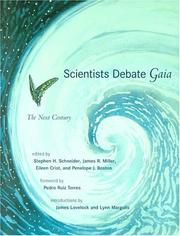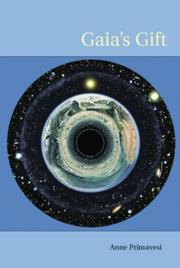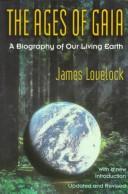| Listing 1 - 10 of 14 | << page >> |
Sort by
|
Book
ISBN: 019150176X 9780191501760 9780199587049 0199587043 Year: 2011 Publisher: Oxford New York Oxford University Press
Abstract | Keywords | Export | Availability | Bookmark
 Loading...
Loading...Choose an application
- Reference Manager
- EndNote
- RefWorks (Direct export to RefWorks)
The Earth that sustains us today was born out of a few remarkable revolutions, started by biological innovations and marked by global environmental consequences. Humanity's planet-reshaping activities may be the latest example. By understanding the past revolutions, we can help steer current global change toward a sustainable outcome.
Gaia hypothesis. --- Gaia concept --- Gaia principle --- Gaia theory --- Gaian hypothesis --- Living earth theory --- Ecology --- Geobiology --- Biosphere --- Philosophy
Periodical
ISSN: 26255413 Year: 1992 Publisher: Heidelberg : Spektrum Akademischer Verlag
Abstract | Keywords | Export | Availability | Bookmark
 Loading...
Loading...Choose an application
- Reference Manager
- EndNote
- RefWorks (Direct export to RefWorks)
Environmental sciences --- Gaia hypothesis --- Environmental sciences. --- Gaia hypothesis. --- Gaia concept --- Gaia principle --- Gaia theory --- Gaian hypothesis --- Living earth theory --- Ecology --- Geobiology --- Biosphere --- Environmental science --- Science --- Philosophy

ISBN: 019217665X Year: 1979 Publisher: Oxford Oxford university press
Abstract | Keywords | Export | Availability | Bookmark
 Loading...
Loading...Choose an application
- Reference Manager
- EndNote
- RefWorks (Direct export to RefWorks)
Biology --- Biosphere --- Gaia hypothesis --- Gaia concept --- Gaia principle --- Gaia theory --- Gaian hypothesis --- Living earth theory --- Ecology --- Geobiology --- Life (Biology) --- Planets --- Vitalism --- Philosophy
Book
ISBN: 0823265285 0823265277 Year: 2015 Publisher: New York, NY : Fordham University Press,
Abstract | Keywords | Export | Availability | Bookmark
 Loading...
Loading...Choose an application
- Reference Manager
- EndNote
- RefWorks (Direct export to RefWorks)
Exploring the broad implications of evolutionary theorist Lynn Margulis’s work, this collection brings together specialists across a range of disciplines, from paleontology, molecular biology, evolutionary theory, and geobiology to developmental systems theory, archaeology, history of science, cultural science studies, and literature and science. Addressing the multiple themes that animated Margulis’s science, the essays within take up, variously, astrobiology and the origin of life, ecology and symbiosis from the microbial to the planetary scale, the coupled interactions of earthly environments and evolving life in Gaia theory and earth system science, and the connections of these newer scientific ideas to cultural and creative productions.Dorion Sagan acquaints the reader with salient issues in Lynn Margulis’s scientific work, the controversies they raised, and the vocabulary necessary to follow the arguments. Sankar Chatterjee synthesizes several strands of current theory for the origin of life on earth. James Strick tells the intertwined origin stories of James Lovelock’s Gaia hypothesis and Margulis’s serial endosymbiosis theory. Jan Sapp explores the distinct phylogenetic visions of Margulis and Carl Woese. Susan Squier examines the epigenetics of embryologist and developmental biologist C. H. Waddington. Bruce Clarke studies the convergence of ecosystem ecology, systems theory, and science fiction between the 1960s and the 1980s. James Shapiro discusses the genome evolution that results not from random changes but rather from active cell processes. Susan Oyama shows how the concept of development balances an over-emphasis on genetic coding and other deterministic schemas. Christopher Witmore studies the ways in which a concentrated animal feeding operation, or CAFO, mixes up natural resources, animal lives, and human appetites. And Peter Westbroek brings the insights of earth system science toward a new worldview essential for a proper response to global change.
Evolution (Biology) --- Biodiversity. --- Gaia hypothesis. --- Convergence (Biology) --- Philosophy. --- Biology. --- Earth Sciences. --- Ecosystems. --- Evolution. --- Gaia Theory. --- Lynn Margulis. --- Microbes. --- Symbiosis. --- Systems Theory. --- ecology.


ISBN: 0262283182 9780262283182 0262194988 9780262194983 1417574437 9781417574438 9780262693691 Year: 2008 Publisher: Cambridge, Mass. The MIT Press
Abstract | Keywords | Export | Availability | Bookmark
 Loading...
Loading...Choose an application
- Reference Manager
- EndNote
- RefWorks (Direct export to RefWorks)
The Gaia hypothesis holds that the Earth's physical and biological processes are linked to form a complex, self-regulating system, and that life has affected this over time. This title examines both this theory, as well as other Gaian processes.
Gaia hypothesis. --- Gaia concept --- Gaia principle --- Gaia theory --- Gaian hypothesis --- Living earth theory --- Ecology --- Geobiology --- Biosphere --- Philosophy --- Professional ethics. Deontology --- Nature protection --- Biological anthropology. Palaeoanthropology --- Environmental protection. Environmental technology

ISBN: 0415288347 1134442653 1299140149 128007292X 0203633784 9780203633786 9780415288347 9780415288354 0415288355 0415288355 9781134442652 9781134442607 1134442602 9781134442645 1134442645 9781299140141 Year: 2003 Publisher: London New York Routledge
Abstract | Keywords | Export | Availability | Bookmark
 Loading...
Loading...Choose an application
- Reference Manager
- EndNote
- RefWorks (Direct export to RefWorks)
Gaia's Gift, the second of Anne Primavesi's explorations of human relationships with the earth, asks that we complete the ideological revolution set in motion by Copernicus and Darwin concerning human importance.
Religion and science --- Theological anthropology --- Human ecology --- Gaia hypothesis. --- Gaia concept --- Gaia principle --- Gaia theory --- Gaian hypothesis --- Living earth theory --- Ecology --- Geobiology --- Biosphere --- History. --- Christianity --- History of doctrines. --- Religious aspects --- Christianity. --- Philosophy --- History of controversy
Book
ISBN: 1469651653 1469651661 9781469651651 9781469651668 9781469651644 1469651645 9781469651996 1469651998 9798890854889 Year: 2019 Publisher: Chapel Hill
Abstract | Keywords | Export | Availability | Bookmark
 Loading...
Loading...Choose an application
- Reference Manager
- EndNote
- RefWorks (Direct export to RefWorks)
Health figures centrally in late twentieth-century environmental activism. There are many competing claims about the health of ecosystems, the health of the planet, and the health of humans, yet there is little agreement among the likes of D.C. lobbyists, grassroots organizers, eco-anarchist collectives, and science-based advocacy organizations about whose health matters most, or what health even means. In this book, Jennifer Thomson untangles the complex web of political, social, and intellectual developments that gave rise to the multiplicity of claims and concerns about environmental health. Thomson traces four strands of activism from the 1970s to the present: the environmental lobby, environmental justice groups, radical environmentalism and bioregionalism, and climate justice activism.
Environmental health --- Environmentalism --- Gaia hypothesis --- Gaia concept --- Gaia principle --- Gaia theory --- Gaian hypothesis --- Living earth theory --- Ecology --- Geobiology --- Biosphere --- Environmental quality --- Health --- Health ecology --- Public health --- Environmental engineering --- Health risk assessment --- History. --- Political aspects --- Philosophy --- Health aspects --- Environmental aspects

ISBN: 0393025837 Year: 1988 Publisher: New York (N.Y.): Norton
Abstract | Keywords | Export | Availability | Bookmark
 Loading...
Loading...Choose an application
- Reference Manager
- EndNote
- RefWorks (Direct export to RefWorks)
241.65*7 --- Biology --- -Biosphere --- Gaia hypothesis --- Life (Biology) --- Gaia concept --- Gaia principle --- Gaia theory --- Gaian hypothesis --- Living earth theory --- Ecology --- Geobiology --- Biosphere --- Planets --- Life sciences --- Biomass --- Natural history --- Theologische ethiek: natuur; ecologie --- Philosophy --- Biosphere. --- Gaia hypothesis. --- Philosophy. --- 241.65*7 Theologische ethiek: natuur; ecologie --- Life (Biology). --- Vitalism
Book
ISBN: 0262193108 9780262193108 Year: 1991 Publisher: Cambridge (Mass.): MIT press
Abstract | Keywords | Export | Availability | Bookmark
 Loading...
Loading...Choose an application
- Reference Manager
- EndNote
- RefWorks (Direct export to RefWorks)
Geology. Earth sciences --- General ecology and biosociology --- Gaia hypothesis --- Geobiology --- Congresses. --- Congresses --- #Hist.Geol --- 550.7 --- 550.7 Geobiology. Geological actions of organisms --- Geobiology. Geological actions of organisms --- Biology --- Earth sciences --- Biosphere --- Gaia concept --- Gaia principle --- Gaia theory --- Gaian hypothesis --- Living earth theory --- Ecology --- Philosophy --- Hypothèse de Gaïa --- Géobiologie (sciences naturelles) --- Gaia hypothesis - Congresses. --- Geobiology - Congresses. --- Hypothèse de Gaïa --- Géobiologie (sciences naturelles)
Book
ISBN: 1282694391 9786612694394 0262258692 9780262258692 9780262033756 0262033755 9780262513524 0262513528 9781282694392 6612694394 0262258110 9780262258111 Year: 2010 Publisher: Cambridge, Mass. MIT Press
Abstract | Keywords | Export | Availability | Bookmark
 Loading...
Loading...Choose an application
- Reference Manager
- EndNote
- RefWorks (Direct export to RefWorks)
Essays link Gaian science to such global environmental quandaries as climate change and biodiversity destruction, providing perspectives from science, philosophy, politics, and technology.
Gaia hypothesis. --- Climatic changes --- Environmental ethics. --- Environmental aspects. --- Environmental quality --- Human ecology --- Changes, Climatic --- Climate change --- Climate changes --- Climate variations --- Climatic change --- Climatic fluctuations --- Climatic variations --- Global climate changes --- Global climatic changes --- Gaia concept --- Gaia principle --- Gaia theory --- Gaian hypothesis --- Living earth theory --- Moral and ethical aspects --- Environmental aspects --- Ethics --- Climatology --- Climate change mitigation --- Teleconnections (Climatology) --- Ecology --- Geobiology --- Biosphere --- Philosophy --- Changes in climate --- Climate change science --- Climatic changes. --- ENVIRONMENT/General --- Global environmental change
| Listing 1 - 10 of 14 | << page >> |
Sort by
|

 Search
Search Feedback
Feedback About UniCat
About UniCat  Help
Help News
News